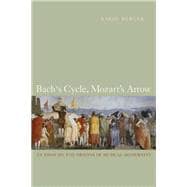
What is included with this book?
| List of Illustrations | |
| Introduction | |
| Prelude | |
| L'Orfeo, or the Anxiety of the Moderns | |
| Bach's Cycle | |
| The Arrested Procession Appendix: St. Matthew Passion, opening chorus, full score | |
| A Crystal Flying Like a Bullet | |
| There Is No Time Like God's Time Interlude | |
| Jean-Jacques contra Augustinum: A Little Treatise on Moral-Political Theology Augustine | |
| The Birth of Autonomy Rousseau The Christian and Modern Outlooks Compared | |
| The Emancipation of Time From Cosmos to History | |
| Mozart's Arrow | |
| Mozart at Play | |
| The Hidden Center | |
| Between Incoherence and Inauthenticity: Don Giovanni and Faust | |
| Die Zauberflouml;te, or the Self-Assertion of the Moderns Postlude | |
| Between Utopia and Melancholy: Beethoven and the Aesthetic State | |
| Acknowledgments | |
| Notes | |
| Works Cited | |
| Index | |
| Table of Contents provided by Publisher. All Rights Reserved. |
The New copy of this book will include any supplemental materials advertised. Please check the title of the book to determine if it should include any access cards, study guides, lab manuals, CDs, etc.
The Used, Rental and eBook copies of this book are not guaranteed to include any supplemental materials. Typically, only the book itself is included. This is true even if the title states it includes any access cards, study guides, lab manuals, CDs, etc.